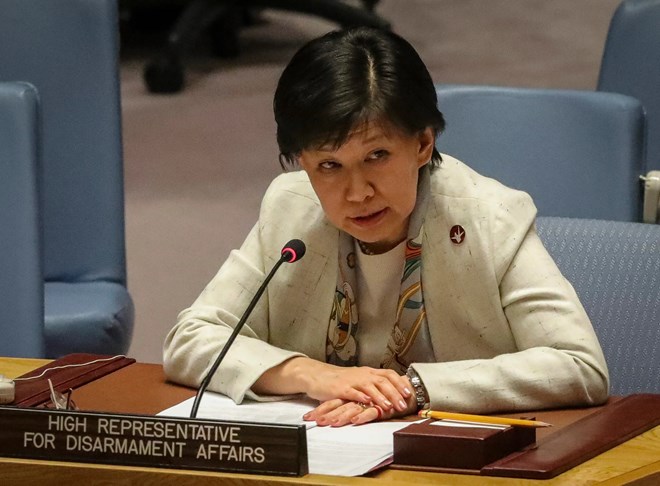
Tuesday April 11, 2023

United Nations Representative for Disarmament Affairs, Izumi Nakamitsu, address a meeting on nuclear non-proliferation treaty in the U.N. Security Council, Wednesday, Feb. 26, 2020, at U.N. headquarters. (Bebeto Matthews / AP file)
Mogadishu (HOL) - Izumi Nakamitsu, the UN High Representative for Disarmament Affairs, recently addressed the Security Council about the inherent risks of arms transfers and the importance of countering weapons diversion for global peace and security. Many delegates at the meeting, which took place during Russia's month-long presidency, referenced the ongoing conflict in Ukraine.
Illicit and unregulated trade of weapons and ammunition has long been a major concern for the international community, with devastating effects on countries like Somalia. These arms transfers can instigate, fuel, and prolong armed conflicts and destabilize entire regions. They can also contribute to human rights abuses and lead to violations of arms embargoes.
According to
a report from the Global Initiative Against Transnational Organized Crime (GI-TOC), more than 60% of illicit weapons found in Somalia were manufactured in China, with Iranian-manufactured weapons also present in the country. These weapons have fueled ongoing violence and instability in the region, with extremist groups such as al-Shabaab and the Islamic State in Somalia acquiring arms through maritime smuggling routes from Iran and Yemen.
The arms smuggling network allegedly
extends to al-Shabaab-linked armed groups in Kenya, Ethiopia, and Mozambique, threatening security in an already volatile region and violating the
United Nations and
European Union sanctions on Somalia.
To combat these risks, states have established numerous international, regional, and bilateral arms control treaties, agreements, and frameworks, such as the Arms Trade Treaty, the UN Programme of Action on Small Arms and Light Weapons, the International Tracing Instrument, and the Firearms Protocol.
Nakamitsu urged Member States to comply fully with their obligations and called for robust frameworks to effectively control the export, brokering, import, transit, storage, and retransfer of weapons and ammunition. She also emphasized the need for strong cooperation and information exchange between states to prevent weapons from falling into the wrong hands and the importance of transparency in armament shipments.